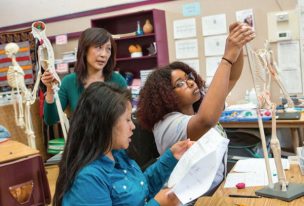Leading Through Learning. Learning Through Leading.
In this blog post Mills Teacher Scholar Executive Director Carrie Wilson describes how teacher leaders build their instructional leadership capacity at the Teacher Scholar Leader Network sessions, a cross-district network of teacher scholar leaders from partner sites. Each of these teacher leaders is facilitating, or co-facilitating with Mills Teacher Scholar staff, a cross-grade inquiry group at their site.
On a sunny Saturday afternoon in October, twenty Bay Area teacher scholar leaders are seated in a large circle with their heads cocked, leaning into the center of the room. They are on their second listening of an audio recording of third graders in a bilingual classroom discussing what they know about the sun and the moon.
 These are veteran teacher scholars who, after just a single listening, can skillfully pull out nuances of what each child contributes in the partner conversation. They note the student’s knowledge of the symbolism of color, the informal register that allows for the expression of unformed ideas, the way the conversation begins as a narrative and shifts to expository talk, and the students’ ability to connect personal experiences with scientific concepts. As the teacher leaders share what they notice after the first listening, Mills Teacher Scholars staff documents what the teachers gleaned from the data. The documentation quickly reaches two pages, but is only the first step of the process.
These are veteran teacher scholars who, after just a single listening, can skillfully pull out nuances of what each child contributes in the partner conversation. They note the student’s knowledge of the symbolism of color, the informal register that allows for the expression of unformed ideas, the way the conversation begins as a narrative and shifts to expository talk, and the students’ ability to connect personal experiences with scientific concepts. As the teacher leaders share what they notice after the first listening, Mills Teacher Scholars staff documents what the teachers gleaned from the data. The documentation quickly reaches two pages, but is only the first step of the process.
As they sit in the circle and listen to the audio data for a second time, the teacher leaders are not simply listening to learn about students, but they are listening with the intention of learning how to lead their colleagues to listen to data in a similar way. The questions that guide their work in the Mills Teacher Scholars Leader Network are: How, as teacher leaders, can we use data to help our colleagues to more deeply understand the learning goals they have for their students and also understand how individual students think in relation to each goal? What is involved in leading adults’ learning about their students’ learning?
Teacher leadership is a hot topic in education circles these days—all new plans for improving student outcomes and helping students engage in “21st Century Learning” seem to hinge on effective teacher leadership. But what we don’t hear much about is what teacher leadership looks like and how a teacher can become an effective teacher leader.
The Mills Teacher Scholars research team, led by Professors Anna Richert and Julie Nicholson, are uncovering what teacher leaders must know and be able to do to be effective instructional leaders that catalyze the necessary shifts at their school site to accommodate deeper learning and Common Core standards. This Spencer Foundation-funded research is designed to study the work of skilled Mills Teacher Scholars teacher leaders as they support their colleagues to learn from classroom evidence. Richert and Nicholson have identified 41 moves that teacher leaders use to support their colleagues to deeply focus on learning about students through looking at classroom student learning data.
One key cluster of leader moves in teacher collaborative spaces centers on the teacher leader’s creation of a climate where their teacher colleagues experience looking together at student work data as a learning opportunity about what students know and how students think rather than as a critique of their teaching ability. Teacher leaders use specific language to communicate that video data, audio data, and class work data are windows into how students are thinking. They help their colleagues to see beyond traditional notions of standardized proficiency data to understand that anything that happens in the classroom that makes student thinking visible provides a valuable way to understand student thinking. This careful, repeated messaging allows their teacher colleagues to approach student data more neutrally, as insight and information about the students’ thinking that signals the instructional changes needed to better meet students’ learning needs.
Supporting teacher leaders to provide meaningful, practice-based learning opportunities for colleagues has become the primary focus of Mills Teacher Scholars. On that October afternoon at the Teacher Scholar Leader Network session Mills Teacher Scholars researchers and facilitators were learning from the teacher leaders about what tools and experiences were most helpful in supporting their colleagues use of data to improve instruction. With our research of this work we look forward to contributing to expanding the understanding of how teacher leaders can create transformative learning experiences for colleagues.

